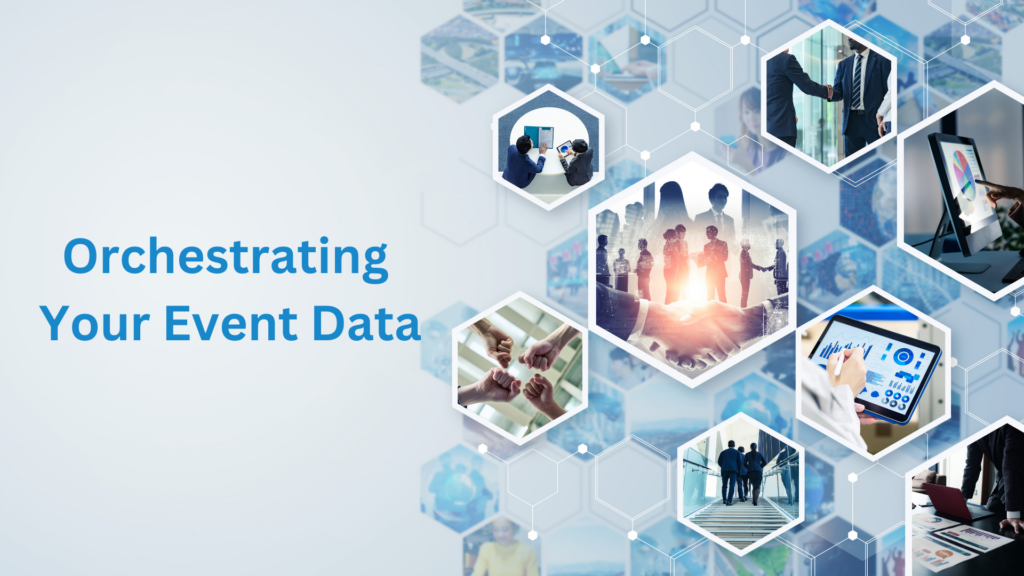Events play a crucial role in B2B marketing, but despite the unique value that event data provides, they often end up siloed and underutilized. By connecting events to your broader sales and marketing strategies, they act as an exceptional way to accelerate the buyer journey and drive more revenue by offering comprehensive, actionable insights into buyer behavior and preferences.
However, the challenge lies in managing and analyzing the vast amounts of engagement data generated. Through sophisticated data processing, event professionals can offer more personalized experiences, accurately measure success, and significantly enhance business value. In this blog, we delve into the concept of Event Data Orchestration, exploring its significance and the profound impact it has on the future of events.
The Data Challenge for Event Marketers
According to a recent study by Forrester, 55% of marketers struggle to fully leverage zero and first-party data from their events. The journey of event data begins the moment someone interacts with your event website, but the real challenge comes after the event has ended. Marketers are often left with heaps of raw data collected from various touchpoints, including registration forms, engagement analytics, session participation, and much more.
If not properly managed, this influx of data can result in missed opportunities and uninformed decisions. Without the right tools or strategies, event professionals might end up working through spreadsheets, manually processing data, or even misinterpreting signals, leading to delayed follow-ups and lost revenue. The key to overcoming these obstacles is a structured approach to event data orchestration.
Not All Event Data is Created Equal
It’s important to differentiate between basic registration data and the much more valuable engagement data generated during an event. While registration data offers a limited view of your attendees, engagement data provides deeper insights into how they interacted with your content, sessions, and speakers. This includes:
- Attendee engagement levels (session attendance, duration, participation)
- Content consumption (downloads, session replays)
- Interactive feedback (polls, surveys, Q&As)
By focusing on these metrics, event planners and marketers can better understand their audience’s preferences and make data-driven decisions that enhance the attendee experience.
As events continue to play a critical role in B2B marketing, mastering data orchestration will become the key to staying competitive and maximizing event ROI.
The Event Data Orchestration Journey
To transform raw event data into actionable insights, event marketers need to implement a streamlined process of data orchestration. This involves capturing, cleaning, analyzing, and applying data in a way that leaves no valuable insight behind. Let’s break down the key steps in this journey:
1. Capturing Engagement Data: Start by collecting data across various engagement points, such as surveys, session interactions, gamification elements, and social media activity. The richness of this data provides the foundation for generating buyer insights.
2. Data Cleanup: Raw event data needs refinement to be valuable. Cleansing your event data—removing duplicates, standardizing formats, and validating entries—ensures its reliability. This step helps reduce noise and errors in the subsequent analysis.
3. Data Transformation: Once cleaned, the data can be centralized, allowing you to have a holistic view of trends and sentiments. This is where data orchestration tools come into play. AI-powered platforms like Certain’s Touchpoint Ignite help marketers visualize patterns in attendee behavior, allowing them to respond faster and more accurately.
Turning Engagement Data into Actionable Buyer Signals
Leveraging an AI-powered event intelligence platform like Touchpoint Ignite enables marketers to quickly move from raw data to actionable insights. Instead of spending hours manually analyzing data, these platforms provide instant insights into buyer behavior and event performance. With these insights, you can:
- Understand attendee preferences and behaviors in real-time.
- Track event success metrics like session engagement and content consumption.
- Measure the overall impact of your event across your entire event portfolio.
These insights give event professionals the tools to make informed decisions about future events, optimize marketing follow-ups, and even personalize attendee experiences.
The Event Data Orchestration Cycle
To simplify the orchestration process, event marketers can follow a structured data lifecycle:
1. Collect Relevant Data: Capture information from online registrations, surveys, and attendee interactions, ensuring accurate and consistent data collection throughout the event.
2. Consolidate and Centralize: Store the data in a centralized platform that integrates with your CRM or event management system, ensuring a single source of truth for analysis.
3. Cleanse and Validate: Remove duplicate or erroneous entries to ensure that your dataset is clean and ready for analysis.
4. Analyze and Extract Insights: Use an event intelligence platform to analyze data, identify patterns, and extract actionable insights.
5. Personalize Attendee Experiences: Leverage insights to customize event content and communications for each attendee, enhancing their overall experience.
6. Measure Impact and ROI: Evaluate event success by tracking key metrics like lead generation, attendee satisfaction, and social media engagement.
7. Inform Future Decisions: Use the insights gained from past events to tailor future event strategies, ensuring that each event is better aligned with audience needs and expectations.
Elevate Your Events with Data-Driven Decisions with an Intelligent Event App
By adopting an organized approach to event data orchestration, event marketers can transform raw engagement data into powerful buyer signals that drive faster conversions and deeper customer relationships. AI-powered tools like Certain’s event app, Touchpoint Ignite, make this process seamless, enabling event professionals to generate rich insights with minimal effort. As events continue to play a critical role in B2B marketing, mastering data orchestration will become the key to staying competitive and maximizing event ROI.
Investing in the right tools and processes will not only save time but also help create more personalized, impactful experiences for attendees, while driving business growth. Get started by scheduling a demo with Certain, and see our powerful event management software in action firsthand!
